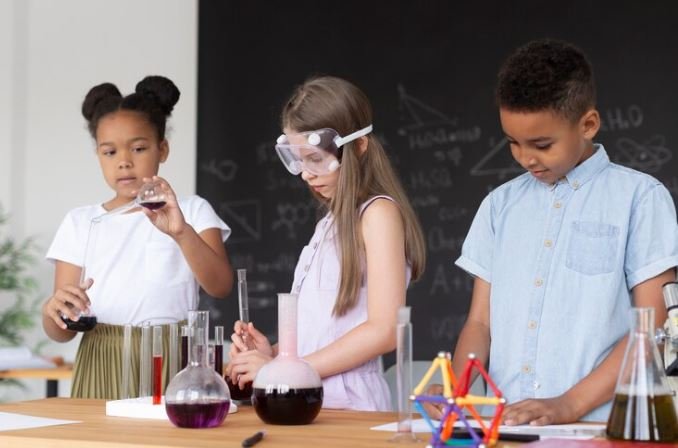To start, science fairs provide a great opportunity for children to learn about the world around them by conducting experiments and making observations. As you get older, the projects become larger and more interesting.
Science Fair Projects for 7th graders allow you to explore these advanced topics in areas like biology, chemistry, physics and environmental science.
These All About Me Primary Grades Projects are a bit more involved than the kindergarten projects so do take some planning but they also have much greater rewards. We will be exploring a few “7th Grade Science fair Projects” which help the juniors at their school science fairs.
Looking for a project that can show off your latest knowledge of how the human body operates, why certain chemicals react with each other and what happens when they do or just to do something more interesting than watch paint dry on rocks cooling after being expelled from a volcano? Here we will examine a few not-so-good ideas as well, as how you can execute your project and ensure it becomes a success.
What Makes a Great 7th-Grade Science Fair Project?
7th-grade science fair projects should spark your interest but put you to the test also. Many projects for middle school are less focused on theory and more focused on realistic issues or questions that demand proof with experimental testing.
Instead of just watching things like plants grow, this could mean something a bit more sophisticated in the 7th grade: How do different types of soil or light affect how they are built? These are things like experiments and data collection, as well as reaching conclusions from the information you gather.
Important Characteristics of An Ideal Science Fair Project
- First start with something you are curious about, maybe a question.
- Enable you to test your educated guess using the scientific method
- Incorporate experiments that are safe to carry out both at home and in a classroom.
- Understandably display your results to the people around you,
So, here we go with some amazing 7th-grade project ideas.
Exploring Chemical Reactions
Watching substances interact is one of the most fascinating parts of chemistry.ResponseEntity(console. log(chemetric360)) Exploring why things change such as a liquid might fizz or turn colour whenever you add another chemical makes chemistry projects perfect for 7th-grade science.
One such thing is seeing which household items create the best chemical reactions. You can also mix baking soda and vinegar to see what happens.
Then you can try other products such as lemon juice or soda to see how different liquids react when baking soda is added. It also helps you learn more about acids and bases as far as how different substances react differently.
You might also mould and bake a “volcano” out of clay, baking soda + vinegar mix so that it blows its top. You can colour the eruption by using food colouring to make it look like lava, and you explain why baking soda bubbled and fizzed during volcanoes.
The Power of Plants and Photosynthesis
Let us start with plants that are easily acceptable as a topic among all species of science fair project ideas if you feel nature is connected and still crave to know about growth. For 7th-grade experiment ideas, countless options go beyond simple plants…
For example, you could experiment with how different colour light affects plant growth. For example, you could get a few plants and keep them under different coloured lights (red one week, blue the next & green), then simply record which ones are growing faster/better.
It teaches you about photosynthesis, the process plants use to make food with light, and how different colours of the light impact that process. Or you could study the effects of different types of water on plants.
For example, you could try watering some plants with tap water and other ones with saltwater or sugary water to compare how their development is affected. You will also learn about how plants wick water up, or why one type of plant prefers springwater to chlorine-laden tap.
Reading Environmental Studies on pollution and water quality
This is a wonderful topic for the 7th-grade science fair that you can investigate as an environmental scientist. For example, if you are worried about pollution or simply want to research a bit more on the environmental science site that causes global warming periodically since recycling and redox methodologies related trends always encourage testing them for free experiment with how polluted water changes its quality or affects plant fecundity.
For example, one project that we could do is to get water from somewhere (like a pond or river or even tap) and test it for pollutants. Materials such as sand, gravel, and charcoal are good for creating a simple water filter The kid can also test how well each type of the materials you use cleans the do. This project teaches you about water pollution, how to filter contaminated dirty water, and its significance importance in both human as well as environment.
Effects of air pollution on plants etc. You can grow plants in various environments – for one plant, you would have to find a space with clean air and another near pollution (e.g. car exhaust or factory).
When you see the way that some plants grow healthily, and others not so much due to other variables such as pollution in their vicinity you start understanding how organisms are impacted by pollutants.
Studying the Environment: Pollution and Water Quality
In essence, physics is the science of figuring out how particular materials move and why they do what they do. Best For: 7th graders Projects Overview: Students study forces including gravity, friction and air resistance so they can apply them to objects that form part of their everyday lives. I like these projects because they let you test forces at play.
You can build paper aeroplanes and see how different one file is. You can create planes with different wing shapes, and then see which one flies the farthest or fastest. This will help you understand basic aerodynamic and air resistance principles.
One more project might be around experimenting with the speed of a rolling object (like, say, a ball can roll or slip faster on different kinds of surfaces.)
Roll a ball down ramps covered in different materials such as carpet, wood or plastic to find out which material slows it the most. This allows you to learn about friction or the force that opposes motion.

Physics and Motion: Understanding Gravity and Forces
You will find numerous awesome science fair projects if you are enthusiastic about biology and how our body operates. Through those questions as well, in 7th grade, you can go deeper into some more complex riddles of how the body works and health.
Some project ideas: simulate how heart rate is affected by exercise. Others read on, and others check the heart rate during different sports (running or jumping), then it is necessary to compare your readings separately, assigning them so that they avoid overloads.
This can help you see how the body reacts when it comes to physical activity and also demonstrate that your heart can send blood faster throughout the entire place than its resting state.
Or explore the senses by testing taste or sight and touch. Also, another deceptive way to test your friends with a blindfold is like this you can make them taste different foods without informing which food they ate and check if they will be able the disclose what type of snack are mereka consuming. It will demonstrate to you how your senses work in concert with one another and enable you to perceive the world.
Investigating Electricity and Circuits
Electricity is also among the interesting categories for science fair projects. You can build basic circuits to investigate how electricity works and the way it is used in a few simple devices as 7th-grade science projects.
One simple project is to make a circuit with a battery, wires and a light bulb. This allows you to experiment with materials such as metal, plastic or rubber which change whether the circuit works.
This will help you understand conductors (materials that allow electric charges to flow through) and insulators (materials in which it is very hard for electric charges to move).
Or even better making an electromagnet out of a battery, wire and nail. If you coil the wire around a nail and hook it to your battery, suddenly you have yourself an electromagnet capable of picking up light pieces of metal like paper clips. Here’s a simple project to help you understand how magnets and electricity can work together.
Solar Power and Renewable Energy
This is a specific strategy to use science in the realm of Clean Energy Nuclear Renewable. The others consume a lot of your money and you can use it in several other experiments to know about the solar power domain better.
Here is one idea: Build a solar oven from cardboard, aluminium foil and plastic warp &rndsh; along with lots of tapes for all the projects I have seen so far! Chuck a small item in there, say a marshmallow or piece of chocolate and time how long it takes to melt. Through this project, you will understand how solar energy works and the way we can cook food with sunshine.
You may also investigate how solar panels function when you experiment with different light sources and observe the change in the output of energy for a personal mini-solar panel. And it might introduce you to a little about renewable energy and the big potential for solar power in the future.
Presenting Your Science Fair Project
After you complete your experiment, it’s time to present your project. Here are some tips to help you create an amazing science fair display:
- Clearly Describe Your Project; Be sure to describe what you tested, why it is meaningful and how you learned. Write in short clear statements so that everyone can understand what is written.
- Pictures are easy on the eyes and help make projects fun to read, so do not slack in using photos for your project.
- Rehearse your presentation: Be sure to practice explaining your project to family or friends, before the science fair. You will feel more confident when you present it to the judges.
- Take pride in your work: You have worked too hard on the project, so revel in it and discuss with others what you did.
Conclusion
Science Fairs- For a chance to find some awesome topics, and learn something new so cool you just have to share it with others. Learn more about chemistry, biology and physics with these “7th Grade Science Fair Projects. There are infinite possibilities whether you’re building a solar oven, creating plant experiments or wiring circuits.
Choose a project you are interested in, stick to the scientific method and show your answers with clarity instead of heading through all this. Science means being curious so never stop asking questions, performing experiments and uncovering the splendidness of this world!


